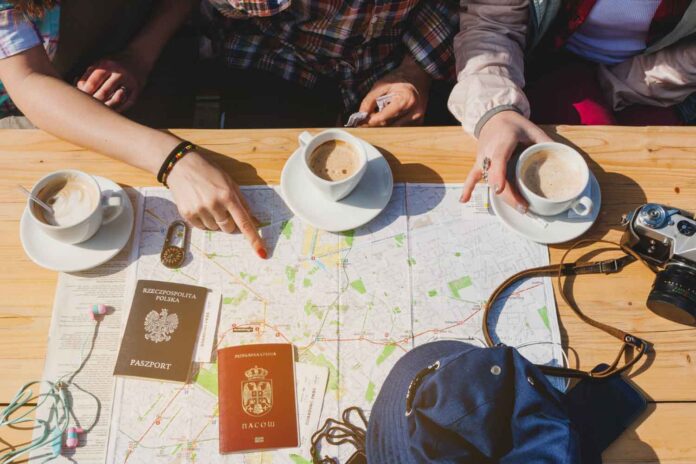The Hainan Free Trade Port (FTP) is about to see a major shift in how tourism is regulated. On December 1, 2025, a comprehensive new law, the Hainan Free Trade Port Tourism Regulations, will take effect, replacing the current provincial tourism ordinance.
Passed by the Standing Committee of the 7th Hainan Provincial People’s Congress, the new law consists of 9 chapters and 68 articles. It introduces modernized rules covering everything from internationalization and industry safety to tourism services, consumer protections, and market integrity.
Here are five core themes shaping the updated regulations:
1. Internationalization & Market Openness
Key takeaway: Hainan is opening its doors wider to global travelers and investors.
A dedicated chapter on “Tourism Opening-Up and Internationalization” outlines a series of high-level liberalization measures aimed at transforming Hainan into a globally influential tourism destination.
Foreign Investment Eased: Restrictions on foreign investment in the tourism sector will be gradually loosened or removed. Qualified foreign-owned and joint venture travel agencies will be allowed to operate outbound tours (excluding Taiwan), and foreign-invested performance troupes with Chinese majority ownership will be permitted.
Expanded Duty-Free Shopping: Offshore duty-free shopping will become more accessible under national regulations, reinforcing Hainan’s position as a global retail destination.
Cruise & Yacht Sector Boosted: Hainan aims to become a hub for international cruise tourism. Simplified customs procedures for yachts, new cruise home ports, and international route development are all on the table.
Medical Tourism Facilitated: The Boao Lecheng International Medical Tourism Pilot Zone will offer streamlined access for foreign patients, supporting Hainan’s ambition to become a premier global destination for medical travel.
Broader Visa-Free Access: Visa-free entry will be expanded for eligible international travelers, subject to national regulations.
Talent Pipeline Development: Hainan will support the import of high-quality educational institutions, allow qualified overseas guides to work locally, and permit foreign nationals to qualify as lifeguards and other tourism-related professionals.
2. Integrated Industry Development
Key takeaway: Hainan is diversifying its tourism offering beyond beaches and resorts.
The new regulations encourage an “all-region” tourism model that blends culture, sports, nature, and wellness to create rich and varied visitor experiences.
New Tourism Models Promoted: These include marine, forest, wellness, rural, cultural, performance, event, sports, low-altitude, educational, and RV camping tourism.
Nightlife & Extended Hours: Tourism zones will allow 24-hour bars and entertainment venues. Shopping malls, restaurants, and cultural institutions will be encouraged to stay open later.
Local Products & Cuisine Supported: Distinctive souvenirs and food brands will be promoted, with the goal of upgrading tourism offerings and expanding consumption options.
3. Quality of Service & Accountability
Key takeaway: Bad actors in the tourism industry will face real consequences.
To address long-standing concerns around service quality, the regulations implement stricter standards and a robust credit system.
Standards with Global Benchmarking: Hainan will align its tourism service standards with international norms while developing its own localized system.
Tourism Credit Records: A credit system will monitor operators and workers. Those found violating rules will be blacklisted and restricted from operating across multiple areas.
Stronger Public Services: Infrastructure like transportation, signage, medical services, and multilingual support will be improved to better serve international visitors.
Streamlined Complaints System: A unified, efficient platform will be established to handle tourist complaints, with an emphasis on timely and transparent resolutions.
4. Market Integrity & Consumer Protection
Key takeaway: Aggressive sales tactics and deceptive pricing won’t be tolerated.
The new rules target unethical practices such as “zero-cost tours” that rely on coerced shopping or hidden fees.
Ban on Below-Cost Tours: Agencies are prohibited from offering tours at unsustainable prices and directing tourists to unlicensed or unsafe shops.
Outlawing Coercive Practices: Tactics such as threats, insults, or service denial to pressure tourists into shopping or extra-cost activities are clearly banned.
Heavier Penalties: Violators will face tougher fines and enforcement, aimed at cleaning up the tourism market for good.
5. Safety Regulations for High-Risk Activities
Key takeaway: Hainan is setting higher safety standards, especially for adventure tourism.
Activities deemed high-risk, such as water sports or other adventure tourism, will face enhanced scrutiny.
Mandatory Licensing & Compliance: Operators of high-risk tourism projects must obtain proper licenses and register their facilities under national standards.
Regular Safety Checks: Equipment must be maintained and inspected regularly to ensure compliance.
Certified Personnel Only: Only qualified individuals holding the appropriate certifications will be allowed to work in high-risk tourism roles.
What It All Means for Hainan
Officials from the Hainan Provincial Department of Tourism, Culture, Radio, Television, and Sports say the new law lays the groundwork for a more open, better regulated, and higher-quality tourism ecosystem. It supports the province’s long-term goal of becoming a world-class, internationally recognized tourism consumption center.
With enforcement beginning in December 2025, stakeholders in the tourism industry, from investors and operators to travelers themselves, can expect a more secure, transparent, and welcoming environment in Hainan.
Related article: Help Us Get a Clearer Picture of Challenges Facing Expats in Hainan









